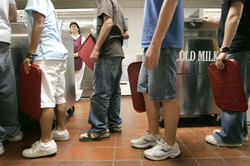Five million children going hungry in the South
A new report by hunger-relief charity Feeding America provides the first state-by-state analysis of early childhood hunger in the United States. The report, Child Food Insecurity in the United States: 2005 - 2007, finds that one in six young children (those who are five-years-old and younger) in 26 U.S. states face a constant threat of going hungry. That means some 3.5 million children under the age of five in the United States face hunger.
 Significantly, the study found that more than 12 million children under the age of 18 in the United States are food insecure, meaning they don't regularly get adequate amounts of nutritious food necessary for a healthy life. The rate of food insecurity in young children is 33 percent higher than in U.S. adults, where one in eight live at risk of hunger, according to the report.
Significantly, the study found that more than 12 million children under the age of 18 in the United States are food insecure, meaning they don't regularly get adequate amounts of nutritious food necessary for a healthy life. The rate of food insecurity in young children is 33 percent higher than in U.S. adults, where one in eight live at risk of hunger, according to the report.
Feeding America based its analysis on federal Department of Agriculture (USDA) and Census Bureau data from 2005 to 2007. The USDA's Economic Research Service (ERS) has collected data on domestic food insecurity since 1995, but this is the first analysis that takes a look at the number of children living in food insecure households by state. The findings show that food insecurity among all children increased dramatically in many states, when compared to USDA data collected between 2003 and 2005.
The South Leads
As a region the South has the largest number of children going hungry. Of the 10 states with the highest rates of food insecure children under 5 years of age, eight are in the South: Louisiana has the highest rate (24.2 percent) of food insecurity in the country followed by North Carolina (24.1), Ohio (23.8), Kentucky (23.3), Texas (23.3), New Mexico (23.3), Kansas (20.9), South Carolina (20.7), Tennessee (20.4), Idaho (20.2), Arkansas (20), West Virginia (19.8), and Missouri (19.8).
Of the 10 states with the highest rates of food insecure children under the age of 18, six are in the South: Texas and Mississippi tops the list, and Tennessee, South Carolina, Louisiana, and North Carolina also rank high.
Totalling the number of food insecure children for the 13 Southern states included in the Institute for Southern's Studies coverage map, the data provided by Feeding America shows that more than 4.7 million children face hunger in the South - 1.2 million of those are under the age of five.
These numbers were already on the rise before the economic downturn, and hunger relief advocates worry that the deepening recession could see an even greater jump in the rates of poverty amongst children.
Bailing out America's children
 Bank failures are making the news, but it's child poverty that's the hidden epidemic, human rights advocates say. And as we move deeper into the current recession, the total number of poor Americans is rising. Families facing food insecurity are regularly forced to make difficult decisions come mealtime.
Bank failures are making the news, but it's child poverty that's the hidden epidemic, human rights advocates say. And as we move deeper into the current recession, the total number of poor Americans is rising. Families facing food insecurity are regularly forced to make difficult decisions come mealtime.
"Families have to make choices between food and house payments," Cassi Johnson, director of the Food Security Partnership at Vanderbilt University, told The Tennessean. "The issue really comes down to income, poverty and lack of living wage."
Hunger can have a lasting social impact on affected children, as well as social costs for the larger nation. There are many long-term health consequences to food insecurity, especially in the early years of life. Young children who go hungry can suffer physical behavioral problems and developmental delays, as well as poorer academic achievement. Moreover, many of the consequences of malnutrition in young children are irreversible.
As the report's lead researcher, Dr. John Cook of the Boston Medical Center and Boston University School of Medicine, notes:
"The startling fact that so many very young children in this country do not have adequate nutrition necessary to grow and develop into healthy adults is heartbreaking. It is all the more tragic when one considers that it is also entirely preventable," said Vicki Escarra, president and CEO of Feeding America.
In the immediate future, child advocates are calling for the expansion of federal food assistance programs, as well as better federal and state programs that would provide adequate safety nets for impoverished families and children.
 Significantly, the study found that more than 12 million children under the age of 18 in the United States are food insecure, meaning they don't regularly get adequate amounts of nutritious food necessary for a healthy life. The rate of food insecurity in young children is 33 percent higher than in U.S. adults, where one in eight live at risk of hunger, according to the report.
Significantly, the study found that more than 12 million children under the age of 18 in the United States are food insecure, meaning they don't regularly get adequate amounts of nutritious food necessary for a healthy life. The rate of food insecurity in young children is 33 percent higher than in U.S. adults, where one in eight live at risk of hunger, according to the report.Feeding America based its analysis on federal Department of Agriculture (USDA) and Census Bureau data from 2005 to 2007. The USDA's Economic Research Service (ERS) has collected data on domestic food insecurity since 1995, but this is the first analysis that takes a look at the number of children living in food insecure households by state. The findings show that food insecurity among all children increased dramatically in many states, when compared to USDA data collected between 2003 and 2005.
The South Leads
As a region the South has the largest number of children going hungry. Of the 10 states with the highest rates of food insecure children under 5 years of age, eight are in the South: Louisiana has the highest rate (24.2 percent) of food insecurity in the country followed by North Carolina (24.1), Ohio (23.8), Kentucky (23.3), Texas (23.3), New Mexico (23.3), Kansas (20.9), South Carolina (20.7), Tennessee (20.4), Idaho (20.2), Arkansas (20), West Virginia (19.8), and Missouri (19.8).
Of the 10 states with the highest rates of food insecure children under the age of 18, six are in the South: Texas and Mississippi tops the list, and Tennessee, South Carolina, Louisiana, and North Carolina also rank high.
Totalling the number of food insecure children for the 13 Southern states included in the Institute for Southern's Studies coverage map, the data provided by Feeding America shows that more than 4.7 million children face hunger in the South - 1.2 million of those are under the age of five.
These numbers were already on the rise before the economic downturn, and hunger relief advocates worry that the deepening recession could see an even greater jump in the rates of poverty amongst children.
Bailing out America's children
 Bank failures are making the news, but it's child poverty that's the hidden epidemic, human rights advocates say. And as we move deeper into the current recession, the total number of poor Americans is rising. Families facing food insecurity are regularly forced to make difficult decisions come mealtime.
Bank failures are making the news, but it's child poverty that's the hidden epidemic, human rights advocates say. And as we move deeper into the current recession, the total number of poor Americans is rising. Families facing food insecurity are regularly forced to make difficult decisions come mealtime. "Families have to make choices between food and house payments," Cassi Johnson, director of the Food Security Partnership at Vanderbilt University, told The Tennessean. "The issue really comes down to income, poverty and lack of living wage."
Hunger can have a lasting social impact on affected children, as well as social costs for the larger nation. There are many long-term health consequences to food insecurity, especially in the early years of life. Young children who go hungry can suffer physical behavioral problems and developmental delays, as well as poorer academic achievement. Moreover, many of the consequences of malnutrition in young children are irreversible.
As the report's lead researcher, Dr. John Cook of the Boston Medical Center and Boston University School of Medicine, notes:
Children are the engine for economic growth in the United States. Hunger creates unbearable, unsustainable costs that ripple through the economy and prevent economic success. If we fail to give them the nutrition and health supports they need in the first three to five years of life, our economy cannot fulfill its potential.Child rights' advocates are hoping that states, particularly in the South, begin to invest time, energy and funding into policy solutions that would tackle the issue of child hunger and child poverty across the region.
The first three years of life are the most critical period of brain growth and development. Child hunger causes physical and mental impairment that may never be reversed. Child hunger also creates tremendous costs that are completely unavoidable. There is no better investment in a prosperous future than investing in ending childhood hunger.
"The startling fact that so many very young children in this country do not have adequate nutrition necessary to grow and develop into healthy adults is heartbreaking. It is all the more tragic when one considers that it is also entirely preventable," said Vicki Escarra, president and CEO of Feeding America.
In the immediate future, child advocates are calling for the expansion of federal food assistance programs, as well as better federal and state programs that would provide adequate safety nets for impoverished families and children.
